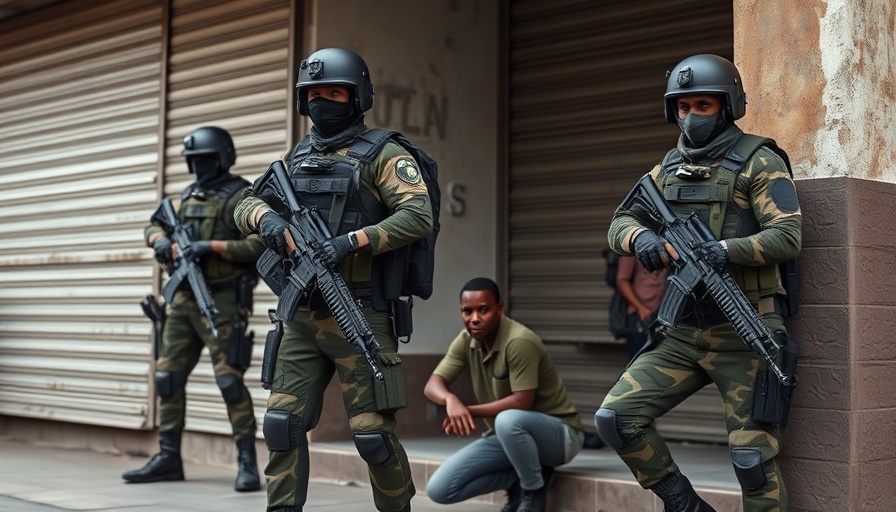
Tragic Circumstances of a Young Vendor: What Happened in Nairobi
The recent tragic incident involving Bonfas Karuki, a 22-year-old hawker in Nairobi, represents a chilling reality of police violence in Kenya. Merely attempting to earn a living by selling face masks, Karuki was caught in the crossfire of protests that erupted following the suspicious death of blogger Albert Jang. Declared brain dead by doctors at Kenyatta National Hospital, his family now faces the devastating potential loss of a son tragically shot in a moment of chaos.
In 'Nairobi hawker shot at close range by police declared brain dead', the video highlights police violence and its devastating impact on communities, prompting us to delve deeper into the underlying issues.
The Background of Widespread Protests
The protests that enveloped Nairobi were ignited after Albert Jang was found dead in police custody, prompting outrage among citizens who demanded accountability and justice. The intersection of journalism, politics, and civil liberties in Africa often faces significant hurdles, and Jang's death has magnified existing tensions between law enforcement and communities. This incident is not isolated; it mirrors a broader pattern wherein populations nationwide are demanding government accountability and reform regarding excessive use of force.
Understanding the Socio-Political Context
Kenya’s socio-political landscape is complex, characterized by a multifaceted relationship between the government and its citizens. The legacy of colonialism, coupled with ineffective governance and systemic failures, results in heightened civic discontent. Protests, often fueled by injustices like that of Karuki's, reflect a societal yearning for change. The struggle intensifies as citizens lament police brutality and question the integrity of those tasked with their protection. This is emblematic of larger trends across Africa where police violence becomes a flashpoint for civil unrest.
Health System Response to Violence
As the nation grapples with the ramifications of police violence, the health care system's role becomes increasingly pivotal. In Karuki's case, the failure of law enforcement has also placed immense strain on medical professionals. The proclamation of brain death, which signals that Karuki's brain stem has ceased functioning, illustrates the grim outcomes that stem from injuries incurred during violent encounters with police. Such situations highlight the critical need for reforms that prioritize both medical care and preventive measures against violence.
Calls for Accountability and Reform
The incident raises pressing questions not only surrounding the accountability of individual officers but also regarding systemic failures within the Kenyan police force. Activists and human rights organizations are amplifying calls for thorough investigations and greater oversight of police activities. As demonstrated in protests following Karuki's shooting, the demand for justice reflects a society unwilling to remain passive in the face of oppression. These movements are crucial for fostering change and ensuring that Kenya remains steadfastly committed to improving human rights standards.
Potential for Change Through Civic Engagement
As citizens mobilize around this incident, it unveils a shifting narrative regarding citizen engagement and activism throughout Africa. The aftermath of Karuki's tragic shooting could serve as a turning point, spurring solidarity and generating widespread discourse on governance and police reform. By leveraging social media and community organizing, voices demanding change can no longer be ignored. Increased civic engagement presents an opportunity for transformation and could yield long-lasting benefits for governance in Kenya.
Dividing Perspectives on Police Authority
While there is unified outrage regarding police brutality, there lies a divide among various communities regarding the role of police authorities in maintaining order. Some argue that police are necessary to control unrest and protect citizens, while others express that the use of excessive force creates a pervasive environment of fear. This divide complicates the path forward, necessitating dialogue that can bridge perspectives and foster solutions that prioritize community well-being over violent enforcement.
Conclusion: A Call for Action Amidst Tragedy
In summary, the unfortunate story of Bonfas Karuki, shot by a police officer during a protest, lays bare the ongoing struggle against systemic violence in Kenya. As voices rise amidst the sorrow, it is imperative for citizens and leaders alike to advocate for transparent governance and vital police reforms. The challenge remains before us to foster a safe environment for all Kenyans, where the streets echo not just with protests but with calls for collective justice and accountability.
For those wanting to contribute to this crucial conversation about police accountability and reform in Kenya, it's important to stay informed and engaged with ongoing movements that demand change across Africa. Share your voice through local and international forums and support organizations that advocate for justice.
 Add Row
Add Row  Add
Add 




Write A Comment